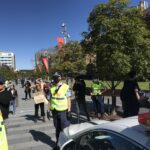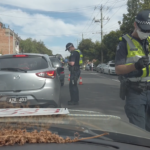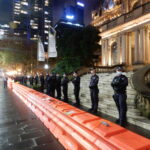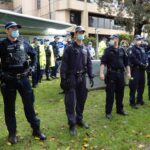Restore the Right to Protest: An Interview With Democracy Is Essential’s Vinil Kumar
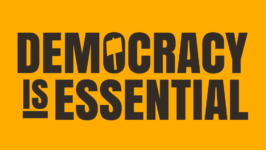
Although there’s been no major announcement, the Berejiklian government has implemented a ban on outdoor protests of more than 20 people. And NSW police has been enforcing this rather underhanded prohibition since late July.
After unsuccessfully attempting to have a court order prevent the massive 6 June Black Lives Matter protest, NSW police saturated the Sydney CBD with blue uniforms to overwhelm a follow up rally the next Friday evening. While on 13 June, it almost policed the life out of a refugee rights protest.
But it was not until the court-prohibited 28 July Black Lives Matter rally was shut down that it became apparent something had changed.
Despite very few socially distanced protesters being present in the Domain for the rally, police were still empowered to pick a few off and lawfully arrest them.
The officers present on the day were simply exercising the ban on outdoor meetings or assemblies “for a common purpose” of more than 20 people, contained under section 18 of the Public Health (COVID-19 Restrictions on Gathering and Movement) Order (No 4) 2020.
The crackdown on student protest
NSW police took a disliking to Black Lives Matter, as the movement stands in direct opposition to its racism and brutality. Perhaps, a less likely target of enforcing the protest ban has been Sydney University students, as, while they’ve been organising, it’s been against the federal government.
However, the state police have been sent in to shut down two Sydney University protests recently. These have been relatively small on campus actions. Participants have taken COVID precautions. And yet their voices have been silenced via NSW’s unofficial, and certainly very handy, protest ban.
University staff and students have been mobilising of late, as the Morrison government has taken the opportunity the pandemic has afforded to carry out a series of attacks against the tertiary education sector, including an attempt to hike fees and denying uni staff pandemic wage subsidies.
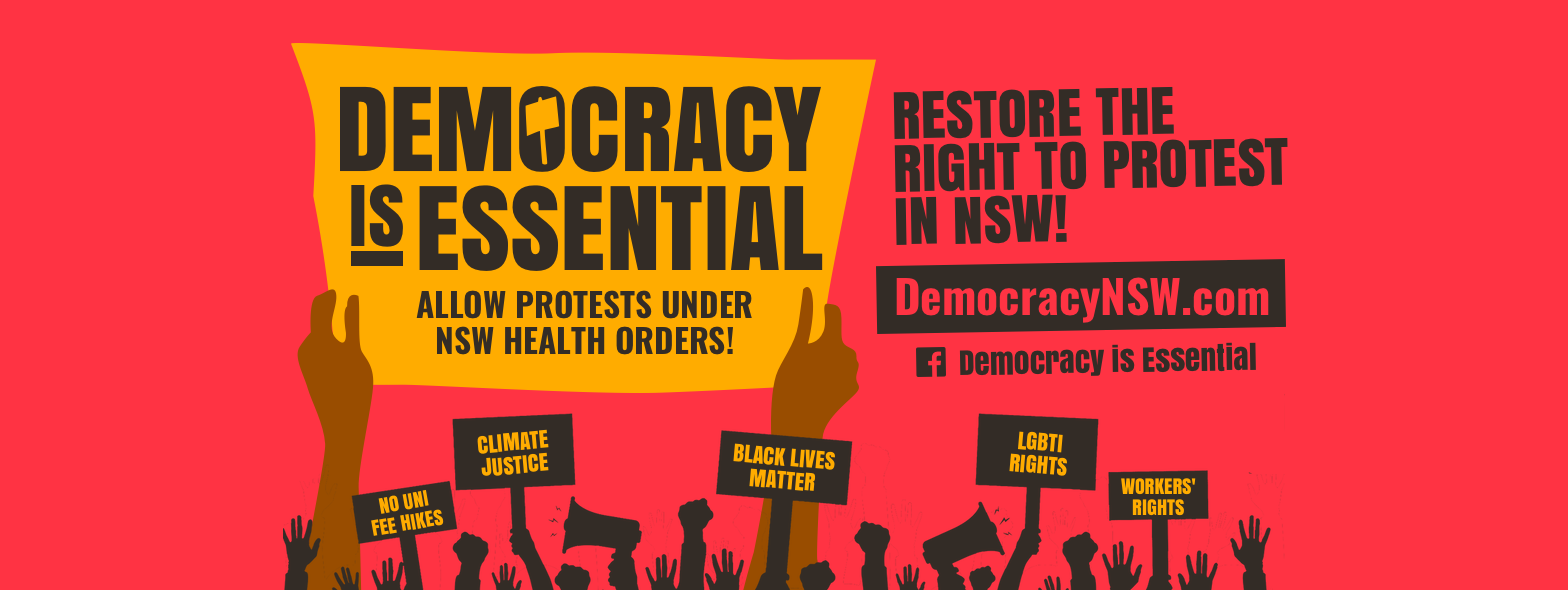
Upholding the right to protest
Indeed, it seems that such a threat was a 28 August Sydney University protest that NSW police decided to deploy the riot squad and mounted officers. National Union of Students ethnocultural officer Vinil Kumar was one of ten demonstrators police chose to arrest and hit up for a hefty fine.
In response to the crackdown on campus protests, students have launched the Democracy is Essential – Restore the Right to Protest in NSW campaign, which is calling “for protest gatherings to be granted an exemption under the NSW public health orders”.
The campaign involves a joint statement outlining why the ban is unjustified and the reasons protest can’t be put on hold. We encourage you to sign the statement, as many other concerned community members and organisations have.
Sydney Criminal Lawyers spoke to Democracy Is Essential spokesperson Vinil Kumar about what’s been happening on the ground in regard to protests and their policing, how he sees this as part of an escalating assault on organising in public and why he posits protests are essential.
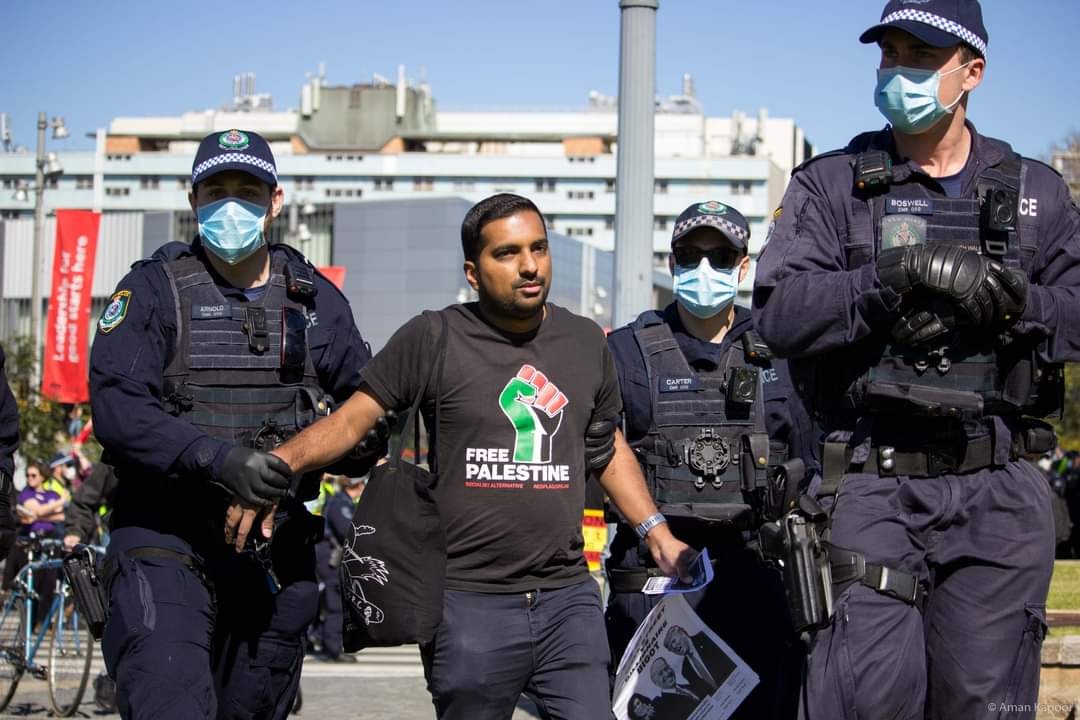
Firstly, on 28 August, a large number of NSW police officers were deployed to Sydney University to deal with a peaceful protest. Around 10 COVID compliant demonstrators were arrested and fined. You were amongst them.
Vinil, how would you describe what happened that day? And why are the police concerned about a fairly lowkey student protest over increasing fees and cuts to funding and jobs?
Clearly, the police showed up with the intention of shutting down the protest regardless of how it had been organised or what was going to take place that day.
By estimate, we had 70 to 80 cops show up at Sydney University with a number of vehicles. There were horses as well.
They moved in as people were gathering. They issued a move on order. And they began grabbing activists and arresting them, including some that were deliberately targeted.
As they were being arrested, some were told that they were on a list of people being targeted at these demonstrations.
In the case of my arrest, my details had been taken and the officers arresting me were about to release me, when the passing commander pointed straight at me, and said, “Him. He’s getting a fine right now.”
So, it was clearly the case that they’d turned up wanting to shut down the demonstration, and intending to single out organisers, or people they thought were prominent.
While this was a demonstration that took place on a university campus, it’s part of a broader picture where the police are clamping down on public protest.
You only need to look at the Black Lives Matter demonstrations of the preceding months, as well as a refugee rights demonstration that was deliberately shut down by NSW police.
It’s about establishing a precedent that protests are not allowed, and there’s now a pretext for them to do it.
This was the second Sydney University protest NSW police has busted up over recent months. And as you’ve mentioned, these were not isolated incidents.
Can you put the crackdown on protests into a broader context for us?
Across the months of June and July, there were a number of Black Lives Matter demonstrations, both in Sydney and in Wollongong. NSW police attempted to get some of them disallowed by the Supreme Court.
When protesters proceeded to gather and assembly anyway, the police then moved in with a heavy riot squad presence. And a number of demonstrators observed that they had the new sound devices designed to disperse crowds at their disposal.
What we are seeing is the escalation of a process that has been going on for years.
In 2002, the NSW government passed laws allowing police to stop and search people without a warrant. And they also gained the power to use move on orders against protests, which had previously been disallowed.
In 2016, there were new penalties introduced for protesting at coal seam gas and mining sites, and the police were given the power to ban people from public places.
In 2017, the police used horses and dogs to break up a refugee rights protest at a Liberal Party fundraiser. At that demonstration, two women were arrested and strip searched in a deliberate act of intimidation, before being released without any charges.
In 2018, there was the Crown land regulation that gave government officials the power to stop assembling on Crown land.
In October last year, there were 40 people who were arrested for participating in an environment protest in Sydney. Most of them had to sign onerous bail conditions, banning them from parts of the city in order to be released.
One of the protesters who refused to sign was kept in custody for over 27 hours without charge before being released.
In December last year, a 13-year-old protester was arrested outside of Kirribilli House. She posed no danger to anyone. She was actually protesting against the government’s inaction on climate change during a bushfire crisis.
What you can see is an escalating use of legal powers by the police, and also a heavy-handed police presence at virtually every demonstration.
Public protests have been increasingly criminalised, and participants and organisers are facing growing intimidation and repression.
The ban on public gatherings of only 20 people is being used to deliberately shut down political protest under the pretext of responding to what is a legitimate and serious health crisis.
It’s well understood that the police are moving in under the pretext of protesters posing a public health risk.
This has been reinforced by the fact that protests are being shut down at the same time as social distancing and other virus preventative measures are being taken.
Meanwhile, there seems to be a disconnect with what else is permitted in the community. Can you speak on this?
Firstly, there hasn’t been a single confirmed case of a transmission at a public protest. There are no confirmed outbreaks that can be linked back to them.
But this has not stopped the NSW government and the NSW police from waging a media campaign against protest, in particular the Black Lives Matter demonstrations.
It’s widely acknowledged that being outdoors is much safer than being in an enclosed environment.
You’re much more likely to catch COVID when going to work or at a shopping centre, than at a protest where organisers have taken every proactive measure to minimise risk, such as mandating people wear masks, supplying hand sanitiser and advising people not to attend if feeling ill.
Meanwhile, what we’re seeing from the NSW government is an almost frenzied rush to return to business as usual, in terms of trying to get the economy going with the opening up of shopping centres, businesses and public recreational venues.
These are all places where there have been confirmed cases of COVID transmission.
When you go through the list of what’s considered more essential than public demonstrations, you can really see this disconnect.
You can have up to 300 people in each area of a casino, and you can have up to 500 people at a community sports event.
In the case of netball games, the health minister explicitly granted an exemption to netball associations, allowing them to have events of more than 500 people. And he said, if they have more than 500 people, all they have to do is separate them into groups of 500.
Yet, at the same time, when protest organisers have tried to say to police that they will separate people into groups of 20, the police have said they can’t, because they’re still gathering for a common purpose, which is not allowed.
So, there’s clearly a double standard being applied to protests. They’re being singled out as a form of activity that is disallowed while the rest of the state is opening up.
You can only interpret this as a deliberate act of the NSW government in saying that people exercising their democratic rights is not essential.
But gambling at a casino, going to a football stadium or buying a new pair of jeans are all more essential than democratic rights.
The police have been able to shutdown protests under the prohibition on public gatherings “for a common purpose”. The Berejiklian government inserted this into the COVID public health order on gatherings in late May.
Today, the police are interpreting this to mean that more than 20 people can’t gather in public if they’re there for the same reason. This is even if they’re socially distanced and wearing masks.
In your opinion, have NSW lawmakers drafted this rule by chance without understanding how it could be interpreted further down the track?
I believe it to be a very deliberate and cynical manoeuvre by the NSW government.
It’s deeply cynical of them to constantly talk about their concerns for public health when it comes to disallowing protests, while at the same time, refusing the demands of the Rail, Tram and Bus Union for masks to be mandated on public transport, which is a sensible public health measure.
So, you have to take their position with a grain of salt.
Liberal governments know full well that public protests and people taking to the streets is one of the main things that has gotten in their way in the past couple of years.
You only need to look at the way in which tens of thousands of people mobilised against Scott Morrison during the bushfires at the start of the year.
You only have to look at how the marriage equality campaign in 2017 mobilised tens of thousands of people and delivered a political defeat to the Liberal Party, and the conservatives of society.
You can go back all the way to 2014, where student protests completely wrecked government plans to introduce university fee deregulation.
It’s quite clear to conservative politicians that public protest is a threat to a conservative agenda.
There are already massive attacks being carried out against students with the increase to university fees.
The climate crisis is still an issue, and the government is continuing to open up more areas in this state to coal and gas exploration and allowing new mines to be built.
So, there’s a lot for the public to oppose the government about and having measures in place that minimise public opposition to the government is a very useful thing.
It’s not like the government is unaware of the impact the ban on public gatherings is having on public protests.
It’s now been tested a number of times. And the NSW government has held fast that protests will not be allowed while other areas of activity are perfectly safe to continue.
The first Sydney University protest that was recently shutdown involved about 35 officers being sent in to deal with 50 civilians. At some of the Black Lives Matter demonstrations, the police have outnumbered protesters.
What do you think about the way NSW police has been operating over this time?
It’s been a heavy-handed response. Looking at Black Lives Matter, these are protests that are deliberately targeting the NSW police as an institution. It’s scrutinised the way in which Indigenous people are being murdered in custody, and their overincarceration.
So, it’s an appalling response that we’ve seen. There’s nothing criminal about people exercising their democratic right to protest.
It should be one of the most basic assumptions of a free society. But that can be questioned, when you look at the way the police have responded.
The Democracy is Essential campaign has just been launched in the wake of the second Sydney University protest shutdown. It’s produced a statement that’s been signed by many.
What are the campaign demands?
Our main demand is that protest gatherings should be exempt under the public health order, in the same way in which casinos, stadiums and netball matches have been granted exemptions.
The right to protest is not some luxury. It’s essential to our society and it’s something that we need to protect.
The demand of the campaign is that while a public health order is required to respond to a serious health crisis, democratic rights should be protected as that happens.
It’s specifically calling for protests to be exempt. This means people can attend protests and organise them in a safe fashion, without having to worry about facing fines, arrest or repression from NSW police.
Lastly, Vinil, what would you say is at stake if things continue in the direction that they have been?
Public protest and collective action has been the only way that progressive change has been won in society.
It’s the main way that governments and institutions have been forced to concede to demands that they don’t want to give into.
That’s something that we have to fight vigorously to protect because there’s so much at stake that we still have to fight around.
The pandemic has not put an end to the injustices of our society. Indigenous people continue to be murdered in custody. There’s still a climate catastrophe going on, while our government continues to expand the fossil fuel industry.
There are increasing attacks on students, workers and the unemployed. There are things that we still have to fight around and if government is able to crack down on our right to protest, what it’s essentially saying is these injustices will continue and people should just shut up and accept it.
Progressive change has never been won by people just shutting up and accepting it. So, this is something that we have to fight vehemently to protect and we have to continue to fight around these causes as well.
We have to try not to relinquish these hard won democratic rights. Democratic rights have never been willingly granted by governments or institutions actively seeking to mobilise power.
They had to be fought for and won. And they’ll have to be fought for and won this time as well.


